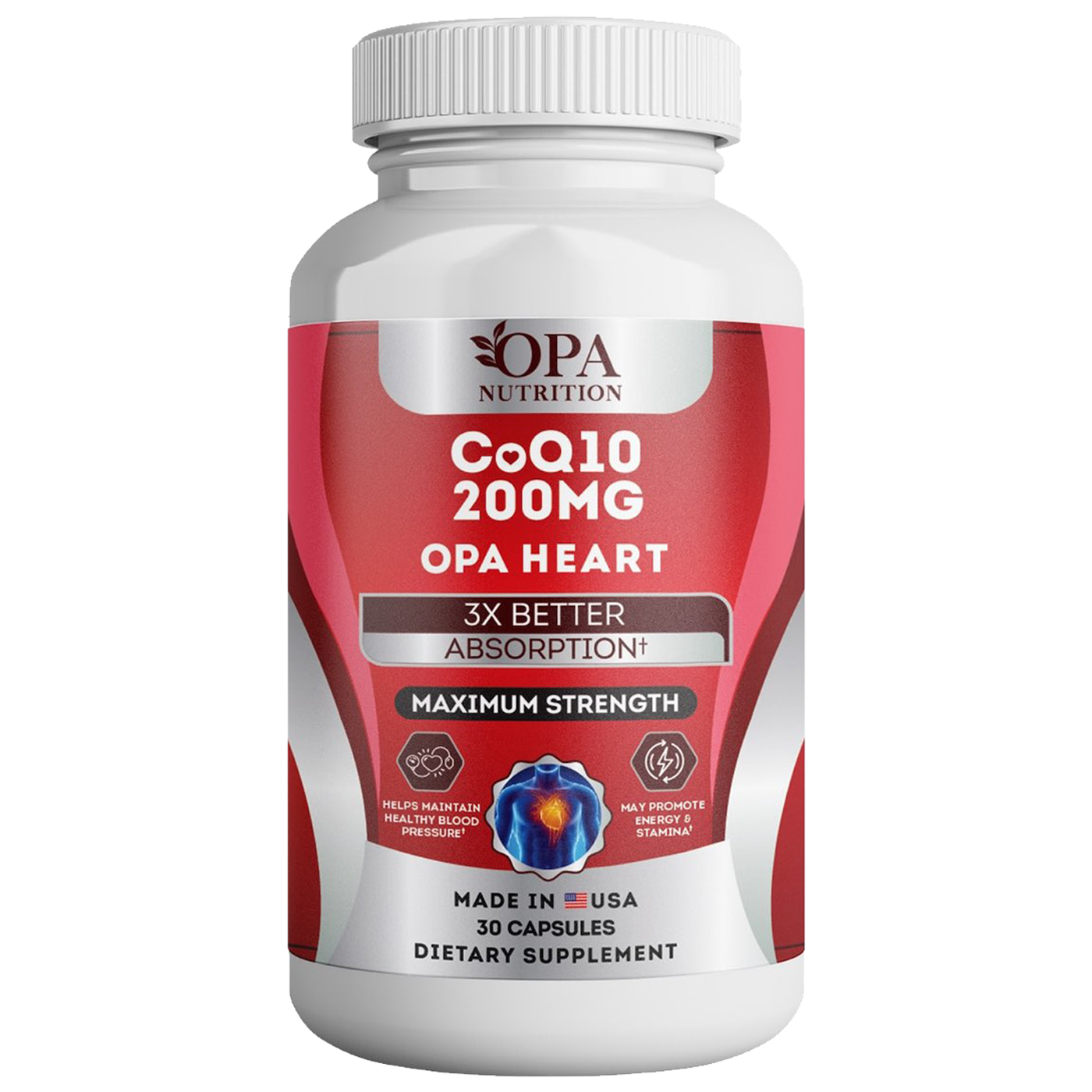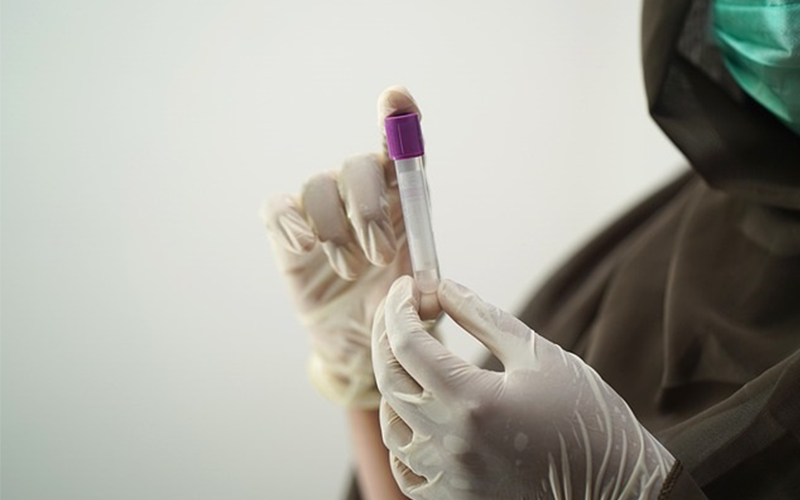Coenzyme Q10 (CoQ10) is a crucial nutrient that plays a vital role in the overall health and well-being of our body. As we age, the body's natural production of CoQ10 decreases, leading to a deficiency that can cause symptoms of low CoQ10, such as fatigue, muscle weakness, and high blood pressure. In this blog post, we will delve into the importance of CoQ10, recognize the how do you know if your CoQ10 is low, and explore ways to address this deficiency to promote better health and vitality.
Short Summary
- CoQ10 is an important factor in overall health, with low levels associated with age-related decline and various symptoms.
- Various methods of testing for CoQ10 deficiency exist to inform the best course of action for improving health.
- Addressing low CoQ10 can be achieved through dietary sources, supplementation and lifestyle modifications. Potential risks should be considered before taking supplements.

OPA Heart
The #1 CoQ10 for Heart Health
The Importance of CoQ10 in the Body

Coenzyme Q10 is an essential nutrient found in every cell, playing a pivotal role in energy production, DNA replication, repair, and acting as an antioxidant. Maintaining healthy CoQ10 levels is crucial for overall well-being, as it helps support heart health, cellular energy production, and protects cells from oxidative damage.
However, factors such as aging, lifestyle choices, and certain health conditions can lead to low CoQ10 levels, which may result in a range of health issues.
Energy Production
At the cellular level, CoQ10 assists in the production of ATP, the primary energy source for the body's cells. This energy production is essential for all cellular functions, such as muscle contraction, cell growth, and maintenance.
By acting as an antioxidant, CoQ10 also safeguards cells from the damaging effects of excess free radicals, which can cause DNA damage and lead to various health problems. Additionally, CoQ10 supplements have been shown to reduce oxidative stress and improve mitochondrial function, potentially aiding exercise performance.
Antioxidant Properties
CoQ10's antioxidant properties play a significant role in protecting cells from oxidative damage, thereby promoting overall cell health. By neutralizing harmful free radicals, CoQ10 helps prevent the damage they can cause to our cells' DNA, which can contribute to various health conditions.
Some studies even suggest that CoQ10 supplementation may help reduce inflammation and migraines. Overall, the antioxidant capacity of CoQ10 is an essential aspect of maintaining optimal cellular energy production and overall health.
Age-Related Decline
As we age, our body's natural production of CoQ10 decreases, resulting in a decline in CoQ10 levels. The body's CoQ10 production decreases with age. By the time a person reaches 60, it's only 40% of what is needed. This age-related decline in CoQ10 levels can lead to various health issues, including disorders of the heart, liver, and lungs.
Research has also indicated that supplementing with CoQ10 may reduce inflammation in individuals with asthma and decrease the need for steroid-based medications to treat the condition.
Causes of Low CoQ10 Levels

Low CoQ10 levels can result from a variety of factors, including aging, lifestyle choices, and certain health conditions such as diabetes, cancer, and vitamin deficiencies. Aging, in particular, leads to a natural decline in CoQ10 production, while lifestyle choices like poor diet, smoking, and excessive alcohol consumption can further lower CoQ10 levels.
Additionally, certain medications, such as statins, can reduce the body's natural levels of CoQ10.
Aging
Aging is a natural cause of CoQ10 decline, as the body produces less of it over time. This gradual decrease in CoQ10 synthesis starts around the age of 25 and continues as we age.
However, some studies have shown that CoQ10 supplementation can help increase CoQ10 levels in various organs or tissues, potentially mitigating the effects of age-related decline.
Lifestyle Choices
Poor lifestyle choices can also contribute to low CoQ10 levels. Diets lacking in CoQ10-rich foods, such as fatty fish, organ meats, and nuts, can lead to lower CoQ10 levels. Conversely, regular physical activity can help maintain healthy CoQ10 levels, while excessive exercise may decrease them.
Smoking and excessive alcohol consumption have also been observed to reduce CoQ10 levels. Addressing these lifestyle factors can play a significant role in maintaining healthy CoQ10 levels.
Health Conditions
Certain medical conditions, such as diabetes, cancer, and vitamin deficiencies, can cause CoQ10 levels to drop. Health conditions can lead to a decrease in CoQ10 levels due to decreased production or increased utilization, or both.
Understanding the link between these health conditions and low CoQ10 levels can help identify potential risk factors and inform the development of targeted treatments.
Recognizing the Symptoms of Low CoQ10

Recognizing the symptoms of low CoQ10 levels is crucial for early diagnosis and intervention. Some common symptoms include fatigue, muscle weakness, heart health issues, and cognitive and neurological effects.
By being aware of these symptoms, individuals can seek medical advice and take appropriate action to address low CoQ10 levels and improve overall health.
Fatigue and Muscle Weakness
Fatigue and muscle weakness are common symptoms of CoQ10 deficiency, as the body relies on CoQ10 for energy production. When CoQ10 levels are low, the body struggles to produce sufficient energy, resulting in feelings of fatigue and muscle weakness. Addressing low CoQ10 levels through dietary sources, supplementation, and lifestyle changes can help alleviate these symptoms and improve overall well-being.
Heart Health Issues
Low CoQ10 levels can lead to heart health issues such as hypertension, heart failure, and arrhythmias. As CoQ10 plays a vital role in maintaining healthy heart function, low levels can result in a range of cardiovascular problems. Proper diagnosis and treatment of low CoQ10 levels can help reduce the risk of these heart health issues and support overall cardiovascular health.
Cognitive and Neurological Effects
Cognitive and neurological symptoms of CoQ10 deficiency can include memory loss, confusion, and difficulty concentrating. CoQ10 supplementation has been widely used to address neurological disorders and may be beneficial for brain function.
However, there are no concrete data available regarding the implications of decreased CoQ10 levels on cognitive and neurological functions. Further research is needed to better understand the link between CoQ10 deficiency and cognitive and neurological symptoms.
Testing and Diagnosing CoQ10 Deficiency

Testing and diagnosing CoQ10 deficiency can be done through various methods, such as blood tests, saliva and cellular testing, or when advised by a doctor.
Accurate diagnosis is essential for determining the appropriate course of action to address low CoQ10 levels and improve overall health.
Blood Tests
Blood tests can measure CoQ10 levels in the bloodstream, but may not accurately reflect CoQ10 levels in tissues and cells. Although plasma measurements are commonly used in clinical evaluations of CoQ10 deficiency, diagnosis is most accurately made by measuring levels in muscle, fibroblasts, or both.
Saliva and Cellular Testing
Saliva and cellular testing can provide more accurate results by measuring CoQ10 levels in cells and tissues. In addition to saliva, CoQ10 levels can be determined in mononuclear blood cells and muscle cells, providing a more comprehensive assessment of CoQ10 deficiency.
When to Consult a Doctor
It is important to consult a doctor if you suspect that you have a CoQ10 deficiency, or if you have chronic diseases such as diabetes, heart failure, kidney or liver problems. Discussing your concerns with your doctor can help determine the appropriate course of action to address low CoQ10 levels and improve overall health.
Addressing Low CoQ10 Levels

Addressing low CoQ10 levels can be done through dietary sources, supplementation, and lifestyle changes. By incorporating these strategies, individuals can effectively manage their CoQ10 levels and support overall health and well-being.
Dietary Sources of CoQ10
Foods rich in CoQ10 include organ meats, fatty fish, meats, vegetables, fruits, nuts, and seeds. Meat, poultry, and vegetable oils are the most abundant sources of dietary CoQ10, while vegetables and fruits generally contain modest amounts, with the exception of avocados.
Consuming a balanced diet that includes these CoQ10-rich foods can help maintain healthy CoQ10 levels.
Supplementation
CoQ10 supplements are available in two forms, ubiquinol and ubiquinone, and are generally considered safe for individuals over 18. There is no definitive CoQ10 dosage agreed upon by everyone. Generally, supplements are taken in doses between 30 and 600 mg.
It is essential to consult a healthcare professional before starting any supplementation, to ensure the appropriate dosage and avoid potential interactions with medications or medical conditions.
Lifestyle Changes
Implementing lifestyle changes can also help increase CoQ10 levels. Quitting smoking, reducing alcohol intake, and eating a balanced diet can all contribute to higher CoQ10 levels. Regular exercise can also facilitate the body's production of CoQ10, further supporting overall health and well-being.
Summary
Understanding the symptoms and causes of low CoQ10 levels is essential for early diagnosis and intervention. By recognizing the importance of CoQ10 in the body, identifying potential causes of low levels, and implementing dietary, supplemental, and lifestyle changes, individuals can effectively manage their CoQ10 levels and support overall health and well-being. Stay proactive in monitoring your CoQ10 levels and consult with a healthcare professional to ensure optimal health throughout your lifetime.
Frequently Asked Questions
If you are experiencing physical fatigue and muscle weakness even while performing low intensity activities, it is possible that your CoQ10 levels may be low. Consequently, it is important to seek the advice of your doctor if you believe that your CoQ10 levels may be low.
CoQ10 deficiency can be caused by primary mutations in genes involved in its synthesis, secondary factors such as statin use and ageing, and certain pathogenic variations. Ageing leads to a natural decrease in CoQ10 levels, while statin use may also reduce levels.
Primary deficiencies are associated with defects in genes directly related to CoQ10 biosynthesis.
Starting CoQ10 supplementation can result in various health benefits, including improved heart health, better blood sugar control, and better management of high blood pressure in those with diabetes.
However, it is important to speak to your doctor or dietician first to ensure that the proper dosage is taken for the best results.
Based on the evidence, low CoQ10 levels can be linked to fatigue in chronic fatigue syndrome patients.
Symptoms of low CoQ10 include physical fatigue, muscle weakness, seizures, intellectual disability, poor muscle tone, involuntary muscle contractions, progressive muscle stiffness, abnormal eye movements and vision loss.
These symptoms can vary from mild to severe depending on the individual and the extent of the deficiency.



